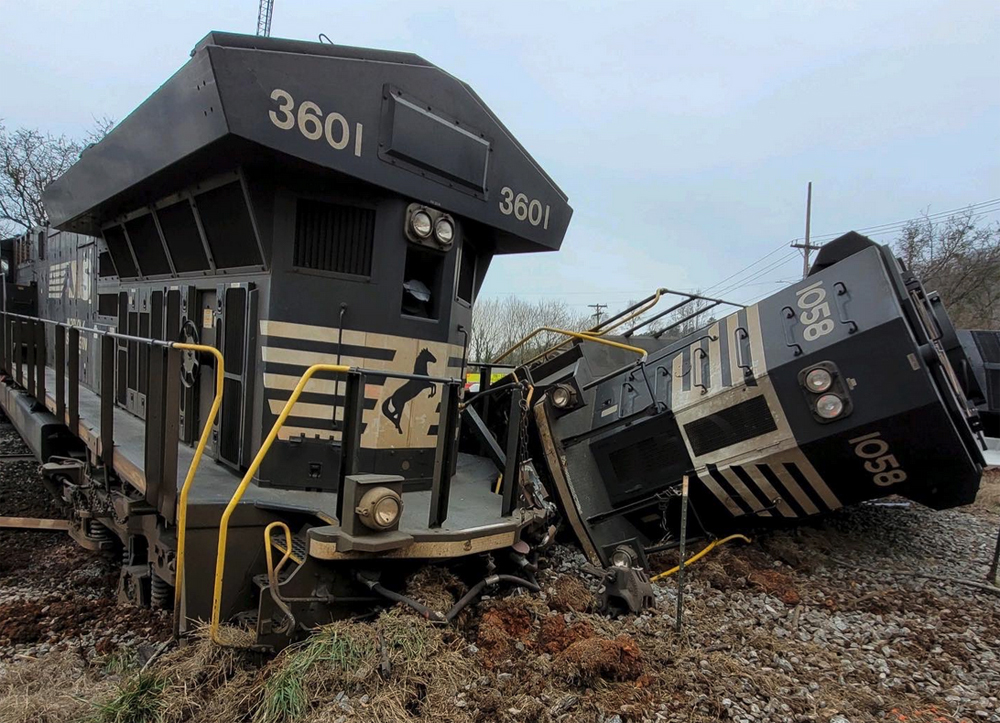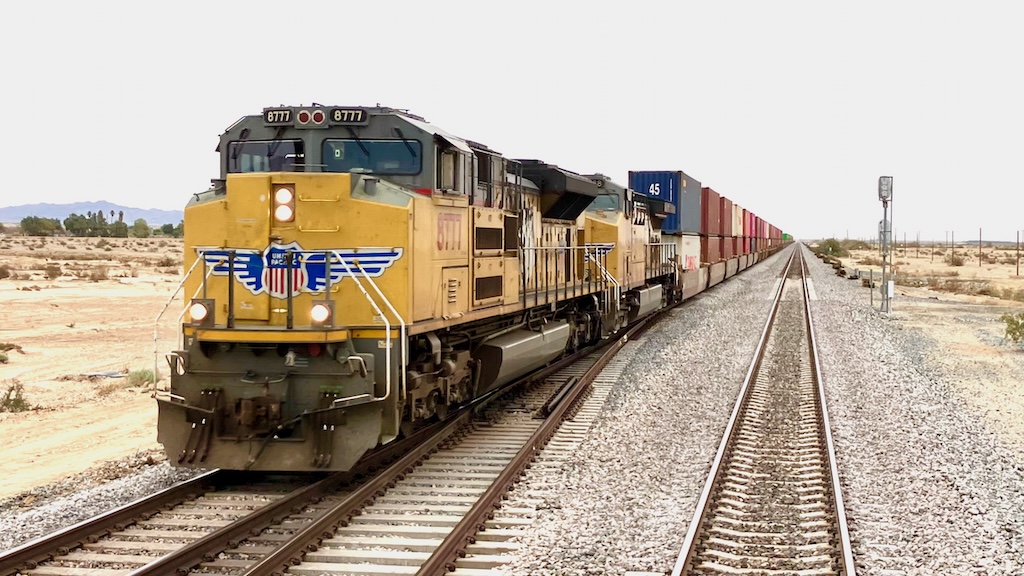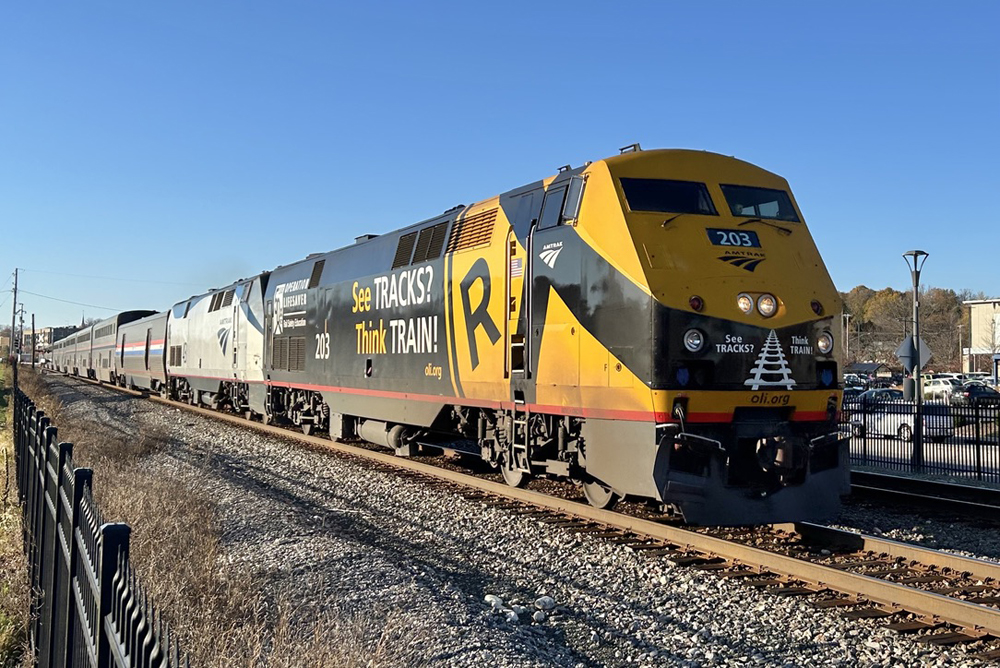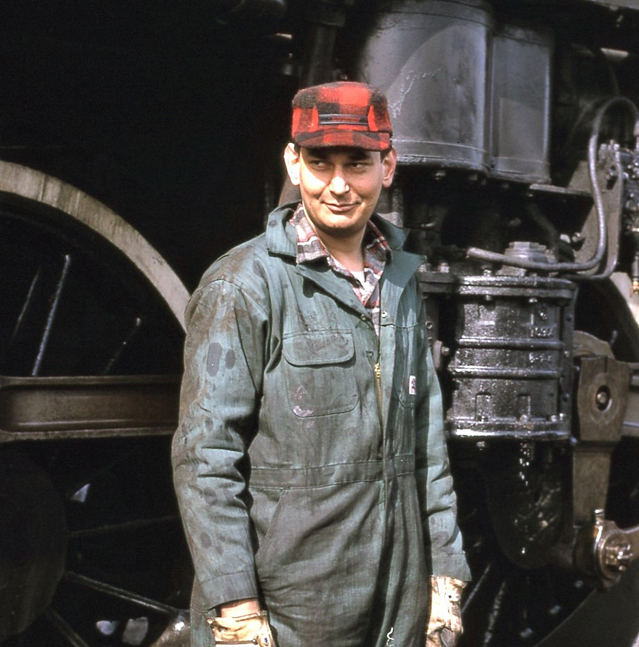
COLLEGEDALE, Tenn. — The driver of a truck transporting a concrete bridge beam that was hit by a Norfolk Southern train at a grade crossing, derailing the train, has been arrested as a result of the incident.
Police in Collegedale, Tenn., have charged Jorge Luis Cruz-Vega, 64, of Martinez, Ga., with failure to yield, felony reckless endangerment, and a registration violation as a result of the Dec. 20 incident.

Cruz-Vega’s truck was stopped at a traffic light, leaving the 137-foot bridge beam fouling the grade crossing, when the NS train came through and struck the beam, derailing the train’s three locomotives and first 10 cars, and sending two crew members to the hospital for treatment of what proved to be minor injuries [see “NS train derails after hitting truck …,” Trains News Wire, Dec. 20, 2022].
In a news release, police say Cruz-Vega proceeded across the grade crossing behind his lead escort car without first assuring his tractor trailer could completely clear the tracks, and that he failed to contact or make arrangements with Norfolk Southern about his delivery route. Cruz-Vega had brought his truck into the oncoming traffic lane before stopping, where it was hit by the oncoming train.
Cruz-Vega has been released on a $10,000 bond. His court date has been set for April 12, 2023.
The Chattanooga Times Free Press reported that the 106,000-pound beam — which had a total cost, including delivery and installation, of $35,000 — was destroyed. It was bound for a $97.2 million road project in Collegedale.














One of the hazards of driving a truck, is if you are involved in a fatality or serious accident the police will arrest you. Irregardless of culpability.
This is the third oversize load grade crossing accident in the last two years that has been reported on(to my memory).
As I have told many a new truck driver when, I was a trainer, you are driving a larger vehicle, your responsibilities are equally larger. With outsize loads that is doubly true.
One place where I think may be a place of improvement is Operation Lifesaver should reach out to, especially the larger companies and truck stops, and do some presentations.
Uhh, Charles? Sorry, man, but you’re just plain wrong here. Basic rules of the road indicate you simply don’t enter an “intersection” whether with another street, or in this case, with a railroad, unless you can clear it. The truck driver (allegedly) knew ho long his truck was, and hew knew (or should have known) that if the traffic light at the other side of the tracks was red, that he would not have been able to clear the tracks if he entered the intersection with the railroad.
(And if he **didn’t** know that, then he doesn’t have any business driving a truck of any type, much less an oversized load, on any road in any country in the world. Period.)
I don’t care if he had an escort or not. At the end of the day, he’s driving his truck; he’s responsible. It’s like a locomotive engineer blowing a red signal. He’s responsible, and no amount of “well, my conductor said it was OK” stuff is going to get him his license back.
Yeah, a railroad analogy would be a train crew operating on territory in which they are not qualified and having been issued a pilot (which is qualified on said territory), I can’t speak from personal experience because I am not personally, directly familiar with any incidents involving a rule violation, like speeding, past a red signal, violating form B, operating without authority, etc, involving a crew with a pilot but I would suspect the crew would remain responsible despite not being qualified. In practice, sometimes the engineer pilot will run the train but in other cases the unqualified engineer will run if maybe he’s had some experience with the territory but is not yet officially qualified.
In another example that I am personally, directly familiar with, a train crew had a road foreman of engines riding with them either on a check ride or due to an engineer trainee being checked and they blew a speed restriction and all crew members including the road foreman suffered suspension, or what we called being “barred” (for a period of time).
As I said before, where was the rear end escort who is responsible for the end of an oversize load, especially that long.
Or is it not required in Tennessee?
The least guilty person is the truck driver. The truck driver is driving the truck. How exactly is he supposed to manage traffic flow?
I am at a loss as to how the escort company has avoided charges in this case. They failed to have traffic protection at an intersection where the load could foul the tracks. To me, it defeats the purpose of having an escort if they are going to help or be responsible.
My view will be tougher on the driver if he has made multiple trips to this site and never brought up the “Oh crap, my load is on the tracks.” I understand blowing a red would be a ticket as well, but again, the escort is there to block it.
Tribute to my late friend and co-worker Richard, PRR fan (we each have our faults), traction fan, and volunteer trolley motorman at East Troy Electric Museum. Among his other duties in his career, he issued permits for oversized loads on the public highways. Well suited for that job as he understood railroading.
This never would have happened under Richard’s watch. He would have made da…..ed sure the haulage company, the escort company, and the local police knew what was involved.
Thomas McGinn is right. It takes more than the truck driver to move an oversized load down the highway.
PS A traffic signal just past a railroad grade crossing is dangerous enough for a compact car. A bridge beam is a whole other hazard.
Oh, and a question for TennDOT, which has the worst traffic engineering brigade this side of {fill in the blank, some fourth-world country which I wouldn’t insult by comparing its roads to Tennessee}. Why no traffic signal pre-empt. Where I live (Wisconsin) the state highway department monitors pre-empts at all affected signals including county highways and local roads.
Innocent until proven guilty, but publicly this step was needed.